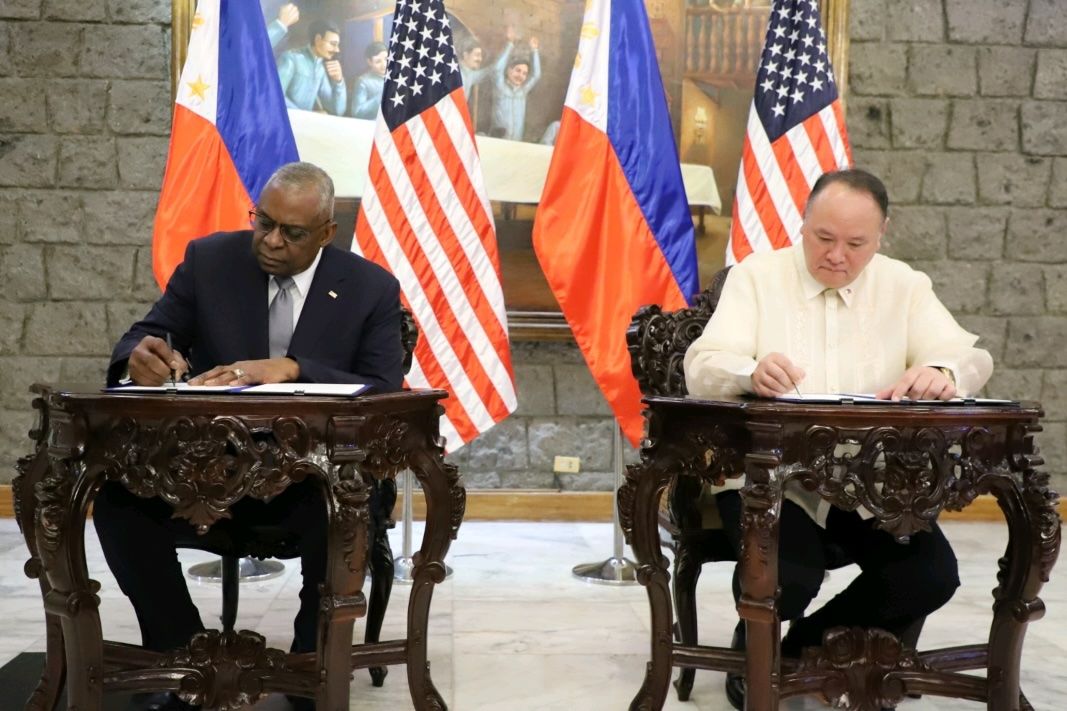'Dawn of a new era' as PH, US ink military intel-sharing pact

The defense departments of the Philippines and United States signed a military intelligence-sharing agreement on Monday, Nov. 18, marking the “dawn of a new era” in strengthening the security alliance between the two countries.
Department of National Defense (DND) Sec. Gilberto Teodoro Jr. and US Defense Sec. Lloyd Austin III inked the General Security of Military Information Agreement (GSOMIA), which concerns security measures for the protection of classified military information, at Camp Aguinaldo in Quezon City.
“This agreement will serve as a framework to facilitate the exchange of classified military information between the Philippines and United States,” the DND said.
Manila and Washington, which also have a defense treaty dating back to 1951 that requires them to help one another in case of an armed attack from a third-party country, began working on the GSOMIA in 2021.
The newly-signed accord enables a real-time exchange of classified intelligence and information amid mounting security concerns shared by the two countries over China’s growing presence in the South China Sea, including claims of areas within the 200-nautical mile exclusive economic zone of the Philippines.
“Not only will this allow the Philippines access to higher capabilities and big-ticket items from the United States, it will also open opportunities to pursue similar agreements with like-minded nations,” the DND noted.
The signing of GSOMIA came after the US government pledged to allocate USD $500 million in foreign military financing (FMF) to the Philippines from the 2024 Indo-Pacific Security Supplemental Appropriations Act by the US Congress during the fourth PH-US 2+2 Ministerial Dialogue in Manila in July.
After the signing of the GSOMIA, Teodoro and Austin led the groundbreaking ceremony of the Combined Coordination Center (CCC) at Camp Aguinaldo which will serve as hub that enables real-time information sharing between the Armed Forces of the Philippines (AFP) and United States Armed Forces “for a common operating picture.”
“It will help boost interoperability for many, many years to come. And it will be a pace where our forces can work side by side to respond to regional challenges,” Austin said.
For his part, AFP Chief, General Romeo Brawner Jr. said the CCC will be a vital nexus for the joint operations between the Philippines and US’ armed forces, as well as a gate way for information sharing and strategic coordination.
It seeks to elevate the capabilities of the AFP and US Armed Forces in humanitarian assistance and disaster response (HADR) and maritime security, ensuring that both forces “can act swiftly and effectively when the need arises.”
"Today isn’t just a ceremony, it is the dawn of a new era in collaboration and partnership between the Philippines and United States, particularly its armed forces," Brawner said.
“It will enhance our ability to collaborate during crisis, fostering an environment where our strengths combine to safeguard peace and security in our region,” the military chief added, stressing that the facility will allow Filipino and US troops to “train as one, plan as one, and respond as one.”
Meanwhile, Teodoro also bestowed Austin with the Outstanding Achievement Medal for his “leadership and commitment” which “have had a profound impact on strengthening the Philippines and United States defense alliance and advancing the shared values of our nation.”
“[Austin] has been instrumental in reinforcing the enduring partnership between our two nations, ensuring that our shared values of democracy, freedom and peace continue to guide our cooperation in the Indo-Pacific region,” Teodoro said of his American counterpart.
Austin marked his fourth visit to the Philippines since taking office in 2021, the most ever by a US secretary of defense. He is set to yield his post once the incoming administration of President-elect Donald Trump assumes office in January next year.
“Under [Austin’s] stewardship, the Philippines-US defense alliance has been significantly bolstered. Secretary Austin’s remarkable contributions not only strengthened the PH-US defense relationship but have also played a central role in advancing regional stability and security,” Teodoro said.
“His dedication in fostering an enduring alliance, promoting peace, and safeguarding our value of both countries is a testament to his exceptional leadership and unwavering commitment to the shared interests of our nation,” he added.